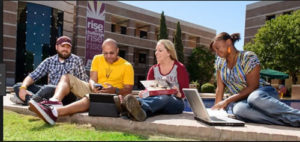Emerging technologies are threatening traditional roles and have created a demand for new types of skilled workers. This challenge is even greater for people already in the workforce. By 2020, 65 percent of all jobs will require postsecondary education and training beyond high school. Those with fewer qualifications will find themselves struggling against significantly more barriers to successful careers while employers will continue to deal with workforce shortages.
One thing we know for certain is that we cannot address this need by solely focusing on the traditional pool of undergraduate and masters-level students. The profile of today’s college student has changed, with fewer students fitting the mold of “traditional.”
According to the National Center for Education Statistics, 62 percent of undergraduate students, described as the “new normal,” have at least one nontraditional characteristic such as being a first-generation student, having at least one dependent, or working either full or part time. As leaders in higher education modeling and delivery, we must foster flexible structures that expand access to higher education for the 31 million Americans who have some college credit but no degree. At Arizona State University (ASU), we’re exploring new pathways to reach the changing demographics of today’s students.
Scaling and evolving online pathways
Online learning has become a promising pathway allowing for greater scale where students can design a path that fits their lifestyle. A recent study found that the number of students taking online courses grew to over 6.3 million students in the U.S., and that number continues to rise. At ASU Online, we recognize that the demographics of adult learners are heterogeneous, and we are reaching out to previously underserved populations of learners with programs that do not require presence inside a classroom or at a particular time. Our programs continue to see significant growth, with more than 30,000 students enrolled in more than 170 undergraduate and graduate degree programs this August.
More degree specializations are now available as universities scale and expand to meet the evolving needs of students. Virtual reality tools enabling completion of lab sciences courses anywhere in the world will be available soon, and adaptive-learning technology is changing the way faculty and instructional designers create courses and evolve the learning process. Research arms like The Action Lab, a dedicated teaching and learning laboratory within EdPlus at ASU, are studying the impact of these tools on student success to achieve better learning outcomes. We are finding that online education is as rigorous and effective as face-to-face learning.
Nurturing online students
For online learning to continue to reach its potential, personalized support and guidance are essential. Many online students are stepping back into school after several years and need personalized resources and support to help them succeed. From a strong faculty support network to student-success coaches and career advisors, universities that provide high-touch services throughout a student’s educational journey see the best student outcomes.
The ASU Online Student Success Center pairs each student with a personal success coach. They help to identify early warning signs and can quickly step in to provide support. Success coaches are a lifeline as these learners juggle life with studying and coursework. By proactively reaching out to students, based on specific behaviors and academic triggers observed in the digital classroom, our success coaches can quickly assist in overcoming obstacles and work to ensure online students stay on the path to graduation.
Partnering to produce a highly educated workforce
Creating new pathways to higher education through online learning is crucial to filling the demand for qualified workers. More than ever, individuals are looking to upskill or re-career and many believe that college is not available to them because it is unaffordable or because of prior academic performance.
At ASU, we’re working with partners such as Starbucks to build a highly educated workforce—qualified for future jobs we cannot even envision. Together with Starbucks, ASU offers the Starbucks College Achievement Plan to all eligible Starbucks employees to earn their bachelor’s degree online with full tuition reimbursement by Starbucks. We hope to graduate 25,000 Starbucks employees by 2025. To help reach this goal, and to make a college degree possible for Starbucks employees who are not currently academically admissible to ASU, we offer a Pathway to Admissions program that enables Starbucks employees to take online courses through our Global Freshman Academy; if they meet academic standards to prove they can succeed in university courses, they are admitted to ASU and the Starbucks College Achievement Plan.
Online learning allows universities to meet “new normal” students where they are—both academically and personally—with more degree specializations, new learning technologies, data analytics, and high-touch support so that each learner can complete a degree in a way that before was simply not possible.
- Survey: More students want to go to graduate school - April 24, 2024
- Educause, AWS launch generative AI readiness assessment tool for higher ed - April 23, 2024
- A bungled FAFSA rollout threatens students’ college ambitions - April 19, 2024

